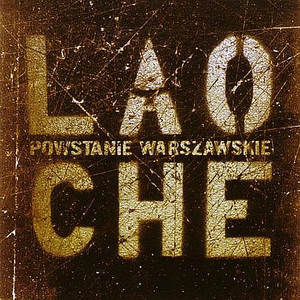Godzina W
Lao Che Lyrics
Jump to: Overall Meaning ↴ Line by Line Meaning ↴
Tramwajem z przedziałem "Nur fur Deutsche".
Z pierwszosierpniowym potem na skroni,
Z zimnem lufy Visa w nogawce spodni.
Siekiera, motyka, piłka, szklanka,
Biało-czerwona opaska, moja opaska na ramię
Powstańca.
Ja nie pękam, idę w śmierć ot tak - na krótką koszulę.
{"Żołnierze Podziemia!"}
Batalion "Zośka".
Batalion "Pięść".
Batalion "Miotła".
"Czata 49", "Parasol".
I wyszedłeś jasny synku z czarną bronią w noc
I poczułeś jak się jeży w dźwięku minut zło
Zanim padłeś jeszcze ziemię przeżegnałeś ręką
Czy to była kula synku, czy ci serce pękło?
{"My, Polacy, mamy opinię romantyków."}
Nam jedna szarża - do nieba wzwyż
Nam jeden order - nad grobem krzyż.
Nam jedna szarża - do nieba wzwyż
Nam jeden order - nad grobem krzyż.
I wyszedłeś jasny synku z czarną bronią w noc
I poczułeś jak się jeży w dźwięku minut zło
Zanim padłeś jeszcze ziemię przeżegnałeś ręką
Czy to była kula synku, czy ci serce pękło?!
The lyrics of the song "Godzina W" by Lao Che tell a story of a soldier going to war. The soldier, riding in a tram car with a compartment reserved for Germans only, has a cold gun barrel in his pants pocket and the insignia of the Polish resistance on his arm. Despite feeling fear inside, he is resolved to face death with bravado. The soldier is part of the "Zoska" battalion, one of the most famous and oldest units of the Home Army, along with the "Fist" and the "Broom" battalions, and the "Umbrella" and "Watch 49" units. The lyrics also ask a haunting question about the soldier's fate - did he die from a bullet or did his heart give out with all the pressure?
This song is a tribute to the soldiers and freedom fighters who fought against the Nazi German occupiers and oppressive communism that followed in Poland. It acknowledges the bravery and sacrifices of these young men who had to take up arms and fight for their right to exist as a free nation. The lyrics reference the phrases and slogans that were common during the war - "Siekiera, motyka, piłka, szklanka" (Axe, hoe, ball, glass) was a popular catchphrase among the resistance fighters that symbolized their everyday tools, "Batalion 'Zośka'" was one of the most heroic Home Army battalions in Warsaw, and the phrase "My, Polacy, mamy opinię romantyków" (We, Poles, have a reputation as romantics) reflects the stereotype of Poland as a country of poets and dreamers.
Line by Line Meaning
Tramwajem jadę na wojnę,
I'm on my way to war by tram, in a compartment reserved for Germans only.
Tramwajem z przedziałem "Nur fur Deutsche".
I'm on my way to war by tram, in a compartment reserved for Germans only.
Z pierwszosierpniowym potem na skroni,
I have the August Cross on my temple.
Z zimnem lufy Visa w nogawce spodni.
I have a cold gun barrel of a Walther P-38 hidden in my pants.
Siekiera, motyka, piłka, szklanka,
I have an axe, a hoe, a ball, and a glass with me.
Biało-czerwona opaska, moja opaska na ramię
I have a white and red armband, my armband with the insignia of the Polish resistance.
Powstańca.
I am a rebel fighter.
W kieszeni strach, orzełek i tytoń w bibule
I have fear, a small eagle emblem, and some tobacco wrapped in paper in my pocket.
Ja nie pękam, idę w śmierć ot tak - na krótką koszulę.
I'm not afraid, I'm willing to die wearing nothing but my shirt.
{"Żołnierze Podziemia!"}
Soldiers of the Underground!
Batalion "Zośka".
Battalion "Zośka".
Batalion "Pięść".
Battalion "Pięść".
Batalion "Miotła".
Battalion "Miotła".
"Czata 49", "Parasol".
"Czata 49", "Parasol".
I wyszedłeś jasny synku z czarną bronią w noc
And you went out, my bright son, with a black weapon in the night.
I poczułeś jak się jeży w dźwięku minut zło
And you felt the shiver in the sound of evil minutes.
Zanim padłeś jeszcze ziemię przeżegnałeś ręką
Before you fell, you crossed yourself with your hand.
Czy to była kula synku, czy ci serce pękło?
Was it a bullet, my son, or did your heart burst?
{"My, Polacy, mamy opinię romantyków."}
{"We Poles, we have the reputation of romantics."}
Nam jedna szarża - do nieba wzwyż
We have one charge - upwards to heaven.
Nam jeden order - nad grobem krzyż.
We have one order - above the grave with a cross.
I wyszedłeś jasny synku z czarną bronią w noc
And you went out, my bright son, with a black weapon in the night.
I poczułeś jak się jeży w dźwięku minut zło
And you felt the shiver in the sound of evil minutes.
Zanim padłeś jeszcze ziemię przeżegnałeś ręką
Before you fell, you crossed yourself with your hand.
Czy to była kula synku, czy ci serce pękło?!
Was it a bullet, my son, or did your heart burst?!
Contributed by Natalie I. Suggest a correction in the comments below.

Jakub Siwek
77 rocznica wybuchu Powstania Warszawaskiego przed nami. Dziękuję Tacie ze zaszczepił we mnie ten album i pamięć o obrońcach naszego miasta i kraju. Młodego pokolenie pamięta i dziękuję. Cześć i chwała bohaterom!!
Laszlo Bihari
Dicsőség a lengyeleknek.
nothinman
super tata !
pozdrawiam dla Ciebie i niego !
genialna płyta!
Lao Che pokazala na niej swą genialność!
Cześć i Chwała Bohaterom!
pozdro
Mi Ro
👍👍👍
xoen6
Tu nie ma słów, kto może sobie wyobrazić wojnę.... ...nie da się.....
Maksymilian Manterys
76 lat temu... jedna z moich ulubionych płyt ! Ciary ogromne na plecach jeszcze słuchając 1-ego sierpnia.
Marcin Kmieć
Dokładnie Maks, czuję podobnie :)
Kasia Perz
Jestem dumna że jestem Polką
krzysztof strug
Ta muzyka mnie ROZ- PIER -DA - LA!!! klękam przed tym na kolana. Łzy cisną się do oczu
Marcin Broniewski
Ryczę kur